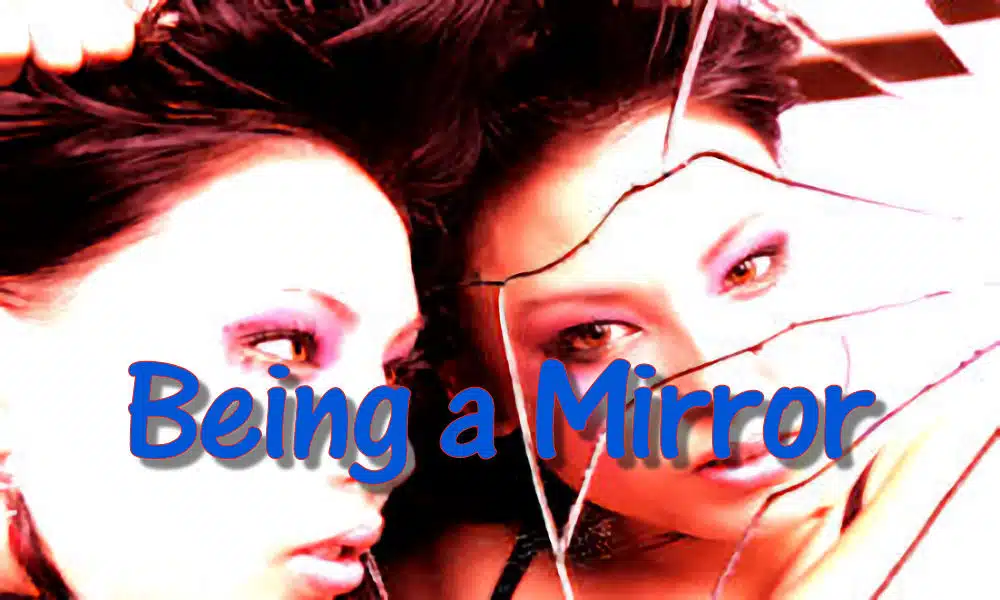Being a Mirror is all about helping others to hear themselves by reflecting back, without judgement.

Want to learn more about living a full and meaningful life?
Want to have the best relationship ever?
Check out my books
I suspect that the reason that most couples have problems with communication is that they have grown up witnessing poor communication.
So let me define a few things that good communication is not.
Good communication is not:
- getting another person to agree with you.
- teaching, explaining, or lecturing.
- manipulating another person into doing things your way.
- bargaining, cajoling, or begging.
Good communication is:
- clearly differentiating between thoughts and feelings.
- being self responsible.
- being willing to honestly state what you know about your thoughts and feelings.
Most people grow up hearing the adults around them speaking from a place of self-righteousness. They hear about wounded feelings, and learned (erroneously) that other people or external situations are responsible for what each adult is feeling.
And speaking of feelings, most adults have real trouble grasping the difference between a feeling and a thought. So let’s start there.
Feelings Are Just That

Note: If your present relationship needs work, well…
check out The. Best. Relationship. Ever.
It’s my relationships book… you’ll find all the help you need!
Here’s a 100% rule for you:
Everything that is going on inside of you is about you, or better put, is “caused” by you.
The Buddhist concept of emptiness speaks to this. We’ve talked about this a lot, but when we say “empty,” we mean “empty of meaning.”
So, using the illustration of speech, what someone says to you is nothing more than sound. What you do with that sound is 100% up to you.
It’s not that I don’t believe people can say something that they intend to be hurtful. It’s that, and here’s the hard part, the intention of the other person has nothing to do with what I do with his or her action.
Adults have complete freedom to, for example, walk out, as opposed to simply blaming the other person.
Once we become adults, we always have a choice about who we hang around with.
If the person we’re with starts using ‘his’ words in an intentionally hurtful way, I can choose not to hurt myself over them, while at the same time stating that we either do therapy or I will leave.
Instead, what typically happens is the person on the receiving end metaphorically “picks up the knife and stabs herself,” demands that the perpetrator stop, and goes immediately to, “This isn’t fair! He shouldn’t be treating me like this!”
This victim-based approach changes precisely nothing.
Three things
In any situation, there are actually only three choices.
- The first is to continue,
- the second is to leave, and
- the third is to whine.
Under “continue,” there are two sub choices.
- One is to accept things as they are, and
- the second is to head into therapy, or something similar, to shift the situation.
I find it odd that most people choose the third option.
So, to go back to the 100% rule, words are words, no matter what mommy told you. Here’s how it actually works.

Let’s imagine that Sally says to Sam, “You never listen to me!”
Now, let’s remember that Sally’s intention is immaterial to Sam’s response. In other words, despite Sally’s intention, the words only mean what Sam makes of them.
There’s really no way to determine whether feelings or thoughts come first. But what happens is this:
- the electrical signals that are Sally’s words reach Sam’s brain.
- At that instant, Sam’s brain simultaneously interprets the words, (decides who “you” is, remembers what “never” means, etc.) and
- then ascribes meaning, while also, perhaps, attaching a feeling.
All of that is Sam’s doing, and has everything to do with who Sam is, how he was brought up, and what his level of self-awareness is.
If Sam is normal, (meaning broken, and inept at communication…) Sam is going to react instead of responding.
- For example, he might flatly deny what he assumes is an accusation. “Of course I listen to you, you never shut up!”
- Or, Sam might specifically challenge the word “never.” “I spent an hour listening to you this morning.”
- Or, he might go on the offensive. “What you mean I don’t listen? You never listen to me! And besides, we haven’t had sex in a week!”
And then, depending on the feeling he creates, he might sulk, walk away, start yelling, etc.
A self responsible person, on the other hand, would do two things.
First, he would indicate what choices he is making internally.
Second, he would express curiosity.
Internal Choices and Being a Mirror
Here’s where we begin to differentiate between feelings and thoughts. According to the communication model that we follow (the Haven Model), all feelings are felt in the body. (Thus, “I feel you don’t understand me” is NOT a feeling.)
For example, we can feel warm toward someone or cold toward someone. We can feel close to someone, or distant from them. We can be attracted, or repulsed. We can feel open, or closed.
Sam might say, “As I hear you say that, I feel cold and distant from you.”
Now, notice that Sam did not say, “You made me…” He uses his language to own his feelings.
There is a very practical reason for doing this. If Sam were to say, “You are making me sad,” Sam would be declaring himself to be a victim, and it’s quite possible that the conversation will get derailed — either Sam and Sally end up talking about Sam’s sadness, or they end up arguing about whether making Sam sad was Sally’s intent.
In either case, Sally’s (poorly expressed) issue gets trumped by Sam’s.
Rather, the self responsible person uses “I” language to describe their internal, self-created “feeling-state.”
“Here’s who I am, and here’s what’s up for me.”
Sam might then shift to what he is thinking.
Darbella and I love to use the following clause — “So, the story I’m telling myself is…” You could substitute “judgment,” or “interpretation” for “the story I’m telling myself.”
Sam: “So, the story I’m telling myself is that you’re trying to pick a fight — and I am making myself anxious, and judging that you no longer love me.”
Now, while the language is a bit kludgy, this is actually a description of what’s going on inside of Sam, and it’s devoid of any blame directed at Sally.
Curiosity and Being a Mirror

If Sally is wise, she hears what Sam is saying — that he’s describing his internal experience and in no way is he blaming her. So Sally can have a breath, as opposed to getting all defensive. In other words, at most, Sally might say, “Tell me more.”
If Sam is wise, having expressed what’s up for him, he might remember where the conversation started. Sally was raising an issue about thinking that she was unheard. (Remember, you can’t “feel” unheard — it’s a thought, not a feeling.)
Sam might say, “I’m curious about what you think I’m not hearing.” This is an open invitation for Sally to share more information, while also noticing her own thoughts.
This is Sam, being a mirror for Sally.
The curiosity question is a very clear mirror — “Here is what I heard — please tell me more.” And it’s called a mirroring question because it acts like a mirror. The reflection in a standard mirror is neither more, nor less, than the object reflected.
Now, as some of you are going to want to argue that real people don’t talk like this — that fighting and arguing and name-calling are the basis of relating.
All I can say is, “How’s that working for you?”
The only thing the “normal approach” gets you is more of the same — resentment, more fights, the silent treatment, anger, drama.
